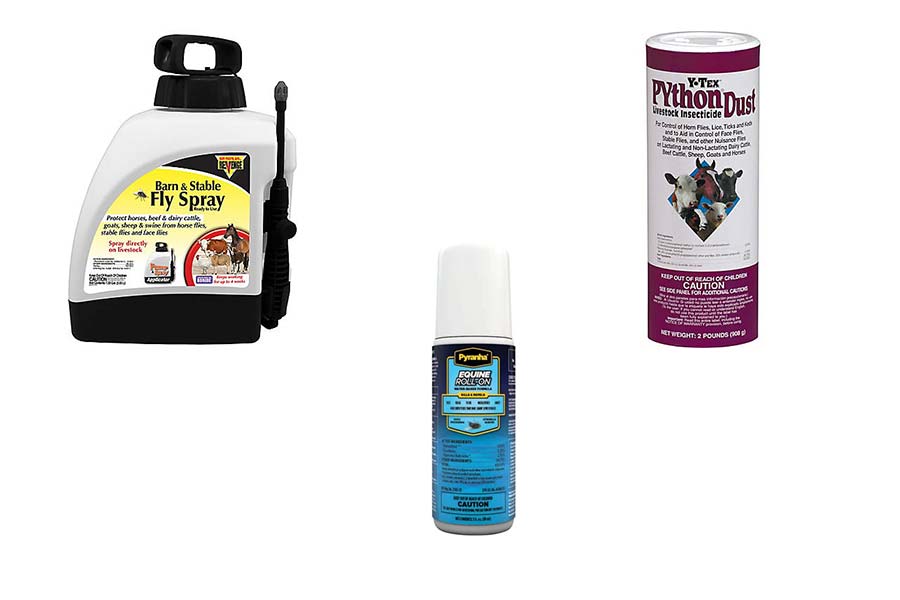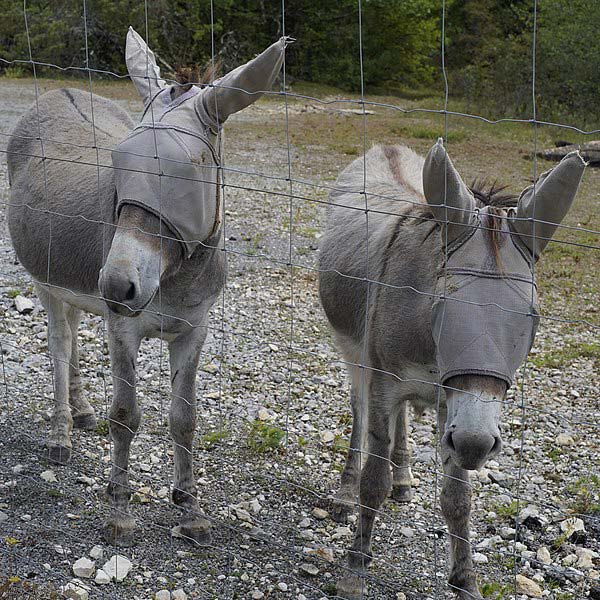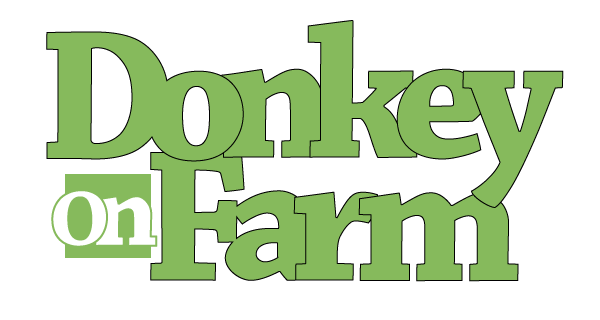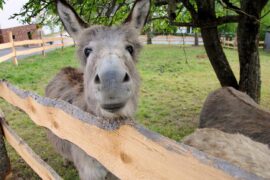Picture yourself strolling through your field enjoying the light summer breeze and sunshine. But as you continue walking and get closer to the pasture, you notice more and more flies start buzzing around your head. When you get to your donkeys, you see that the flies are swarming all around them. Where did they come from, and how can you get rid of those flies on your donkey?
Donkeys have a couple of natural ways themselves to get the flies away. But sometimes they need some extra help. The good news is that we can learn how to prevent excessive numbers of flies on donkeys, how to get rid of these flies, and how to help alleviate the annoyance and pain they can cause donkeys.
How donkeys get rid of flies
You may often find a donkey stomping its foot on the ground and a swarm of flies flying off its leg. Stomping their feet is a way donkeys can get some respite from the incessant flies. Unfortunately, the flies tend to come right back.
Another way donkeys help get rid of flies is to roll around in the dirt and mud. Doing so provides an extra protective layer from the flies. And the mud can even help soothe any itching spots on the donkey.
How to prevent flies on your donkeys?
Prevention is far better than a cure. Flies are attracted to manure and seem to love bothering donkeys. Ensure that paddocks, pastures, and barns remain free from excessive waste. If you can, move the manure and keep manure piles as far away from the donkeys as you reasonably can. Try to keep your donkeys’ shelters in shaded and breezy areas. You can even install powerful fans in your donkeys’ shelter to blow the flies away so long as you ensure your donkey can’t bite the cords.
There are also various products that you can use to help keep flies away before they even become a problem. For example, Fly Predators, don’t use any harmful chemicals or sprays. Instead, every three to four weeks, you’ll receive a shipment of a variety of tiny wasps, a natural enemy to flies, where you’ll then sprinkle them on common breeding areas of flies. These species of wasps are harmless to humans and don’t become pests themselves. These wasps don’t go after adult flies buzzing around but instead feed on flies while still in the larval and pupal stages of growth, thus preventing a significant population growth of flies.
How to get rid of flies on your donkey?
In addition to prevention, there are also many ways to keep flies away from donkeys. A donkey-safe fly spray, roll-on repellant, or powder can be one of the best ways to keep flies off your donkey. Don’t spray directly onto your donkey’s face, though.

Instead, use a cloth or rag to apply the repellant, carefully avoiding the nose, eyes, and mouth. For treatments to be effective, some should be applied several times a day, while others can last as many as ten days with just a one-time application.
Be sure to hang out sticky fly traps and change them regularly. Sticky fly traps help determine the fly population. If the fly population is substantial, you can use a fly mask to cover and protect your donkey’s face and ears.

Flies also seem to love to congregate around a donkey’s legs, where they are often most sensitive. You can use long socks and sometimes vet wraps to protect your donkey’s legs. Remember to check the wrappings frequently to ensure good circulation.
Conclusion
Just as they are for humans, flies are a nuisance to donkeys and can even be harmful to your donkey’s health. Learning how to get rid of flies on donkeys and taking steps to prevent excessive fly population growth will help keep flies at bay during the warmer seasons. When they are especially bothersome to your donkey, products like fly sprays, sticky fly traps, and even socks are beneficial. Try some things out to see which ones work best for you and your donkey.

![How to Get Rid of Flies on Your Donkey? [Plus Prevention Methods] How to Get Rid of Flies on your Donkey](https://donkeyonfarm.com/wp-content/uploads/2022/05/How-to-Get-Rid-of-Flies-on-your-Donkey.jpg)

![How Cold is Too Cold for a Donkey? [Plus Tips to Keep Them Warm] How-Cold-is-Too-Cold-for-a-Donkey](https://donkeyonfarm.com/wp-content/uploads/2022/09/How-Cold-is-Too-Cold-for-a-Donkey-270x180.jpg)
![Should Donkeys Be Stabled at Night? [With Alternatives to a Stable] Should-donkeys-be-stabled-at-night](https://donkeyonfarm.com/wp-content/uploads/2023/04/Should-donkeys-be-stabled-at-night-270x180.jpg)
![How Much Can Donkeys Carry? [Avoid Burdening] How-much-can-donkeys-carry](https://donkeyonfarm.com/wp-content/uploads/2022/04/How-much-can-donkeys-carry-270x180.jpg)
